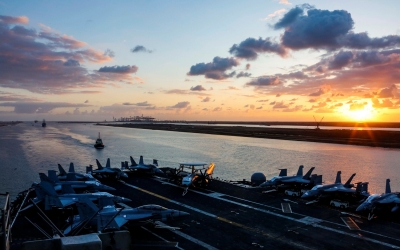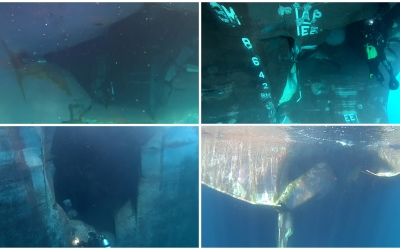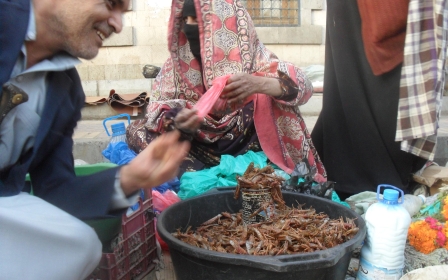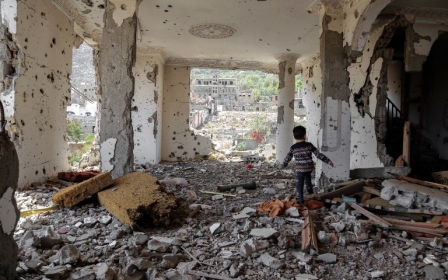Saudi Arabia says 26 civilians wounded in Houthi attack on kingdom's Abha airport

The Saudi-led military coalition said it would make a firm response to a missile attack by Yemeni Houthi forces on a civilian airport in southwestern Saudi Arabia on Wednesday which wounded 26 people.
The Western-backed alliance that has been battling the Iran-aligned Houthi movement in Yemen claimed the early morning attack on Abha airport proved Tehran's support for what it called cross-border terrorism.
The Houthis said earlier on the group's al-Masirah TV that they had launched a cruise missile at the airport in the Saudi mountain resort city, which is located about 200km north of the border with Yemen and serves domestic and regional routes.
The coalition said evidence pointed to Iran's Revolutionary Guards supplying the Houthis with the missile, without further elaboration, the Reuters news agency reported.
'It also proves that these terrorist militias have received new weapons, and that the Iranian regime continues its support'
- Colonel Turki al-Maliki, coalition spokesman
A Houthi military spokesman on Tuesday threatened that the group, which has been battling the Saudi military alliance in Yemen for four years, would target every airport in Saudi Arabia and that the coming days would reveal "big surprises".
New MEE newsletter: Jerusalem Dispatch
Sign up to get the latest insights and analysis on Israel-Palestine, alongside Turkey Unpacked and other MEE newsletters
Flight information showed an Alitalia plane from Jeddah landed one minute before the attack, while an EgyptAir flight scheduled to arrive 25 minutes after the attack was delayed by 45 minutes.
Flights out of the airport resumed around four hours after the incident, although an EgyptAir flight was cancelled.
The Houthi media centre said the strike destroyed the control tower, but Reuters said it could not independently verify the claim.
Houthi spokesman Mohammed Abdulsalam said in a statement reported by al-Masirah on Wednesday that the rebels had the right to defend themselves from the coalition's actions.
"The continuation of the aggression and siege on Yemen for the fifth year, the closure of Sanaa airport and the rejection of a political solution make it inevitable for our people to defend themselves," he said.
Coalition's 'crimes'
A Houthi military spokesman said the attack was a response to the coalition's "crimes" against Yemen.
"The most modern American systems could not intercept the missile," he said in comments carried by the group's media centre.
A coalition spokesman did not immediately respond when asked if the projectile had been intercepted by the kingdom's Patriot missiles before hitting the airport, Reuters said.
The nearest Patriot battery to Abha airport is about 20 km to the north, said Jeremy Binnie, Middle East and Africa editor of Jane's Defence Weekly.
"A cruise missile might be able to come in at a sufficiently low altitude that it could not be engaged before reaching its target," he told Reuters.
'A hostile rocket landed at the arrival lounge'
Colonel Turki al-Maliki, a spokesperson for the coalition, said: "At 02:21 this morning, a hostile rocket landed at the arrival lounge at Abha International Airport, which has thousands of civilian passengers daily from different nationalities."
Maliki said the attack had resulted in the injury of 26 civilians, including three women (a Yemeni, an Indian and a Saudi) and two Saudi children.
The colonel said eight cases had been transferred to hospital to receive treatment for moderate injuries. Eighteen others were treated for minor injuries and have been discharged, he said.
Maliki added that the attack had resulted in some physical damage to the airport hall.
Maliki said: "The military and security forces are working to determine the type of missile used in the terrorist attack, while the Iran-backed Houthi terrorist militia, through its media, claimed full responsibility for this terrorist act using a cruise missile.
"Which constitutes a clear recognition and full responsibility for the targeting of civilians and civilian places that are subject to special protection under international humanitarian law, which may amount to a war crime.
"It also proves that these terrorist militias have received new weapons, and that the Iranian regime continues its support and practice of cross-border terrorism and the continuing violation of relevant Security Council resolutions, including Resolution 2216 and Resolution 2231."
There was no immediate Iranian response, Reuters said.
The attack follows an armed drone strike last month on two oil-pumping stations in the kingdom that were claimed by the Houthis.
Saudi Arabia accused Iran of ordering the attack, a charge that Tehran denies.
'Serious escalation'
The alliance led by Saudi Arabia and the United Arab Emirates intervened in Yemen in 2015 to try to restore the internationally recognised government that was ousted from power in the capital Sanaa by the Houthis in late 2014.
The conflict is widely seen in the region as a proxy war between Saudi Arabia and Iran. The Houthis deny being puppets of Iran and say their revolution is against corruption.
The Houthis have previously targeted Saudi cities with drones and missiles, most of which have been intercepted. In March 2018 an Egyptian was killed in the capital Riyadh by missile shrapnel.
The Houthis last month stepped up its attacks following a lull last year ahead of UN-led peace efforts.
The coalition has responded in the past by carrying out air strikes on Houthi military sites in and around Sanaa.
Bahrain's Foreign Minister Sheikh Khalid bin Ahmed al-Khalifa said the attack on Abha airport "was a serious escalation carried out by Iranian weapons".
Middle East Eye delivers independent and unrivalled coverage and analysis of the Middle East, North Africa and beyond. To learn more about republishing this content and the associated fees, please fill out this form. More about MEE can be found here.






